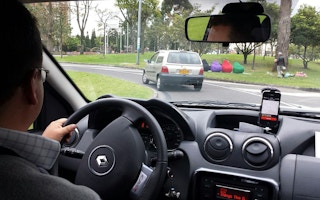A transport revolution is under way. It’s been a while coming. 70 years, in fact, since the tides of car based conspicuous consumption first swept around the world.
Internal combustion. More, heavier, faster. You are what you drive. The car of 1947 was the same in all fundamental respects as the average car of 2017—four wheels, fossil fuelled; owned, parked and polished by one proud individual. Only the shapes and the advertising campaigns changed.
Imagine if our communications had followed the same path—we’d each be the proud owner of a landline phone or three. It might be a fashionable shape, and maybe play music, but otherwise it would be exactly what our grandparents were used to. And there wouldn’t be any other options!
Now it is becoming increasingly clear that passenger transport is ready to catch up, and probably to transform in ways we can only now guess at, as three fundamental trends emerge and converge:
The first has been heralded for decades, but never quite got up the momentum to topple cheap fossil fuel.
Electrification, however, now looks unstoppable as batteries finally enter the cost dive they needed to compete. With battery costs dropping by around 16 per cent per year, most industry commentators point to a tipping point in the 2020s, when electric vehicles will become cheaper than fossil fuelled ones.
“
While the quiet, emission free social appeal of electric cars is clear enough, automated driving is more equivocal. Will these be efficiency enhancing autobots freeing up time and streets, or toys for the rich?
We’ve stopped noticing electric cars on the street as sales grow by 60 per cent a year, and one manufacturer after another is announcing the end of fossil only vehicles.
Even the recent fall in fuel prices has not dented growth, and now cities and nations are getting confident enough to announce legal end dates for fossil vehicle sales or use.
Then there’s automation/self driving vehicles, whose emergence is so sudden it feels like it has just jumped on to our streets out of a science fiction film. But production cars are already driving themselves, legally.
However while the quiet, emission free social appeal of electric cars is clear enough, automated driving is more equivocal. Will these be efficiency enhancing autobots freeing up time and streets, or toys for the rich?
We’ve heard of one prestige manufacturer’s gushing presentation suggesting that, if parking is a problem, your car might circulate in traffic while you’re in your oh-so-important meeting. It doesn’t take much to see where that moronic idea leads.
And a self-driving car, even if inhabited, takes up just as much space as a conventional one. Worse, it undermines a key advantage of public transport, that you can get on with other things en route.
But the biggest, and most democratic of the megatrends doesn’t require any great wealth, or a technological leap. It happens as the mobile communications revolution spreads into the transport space, requiring only that icon which is already replacing the car in our affections—the smartphone.
The smartphone which can call on all the transport modes we already have available: bus, rail, taxi, foot, bike and yes, the (shared) car, and put them together in a “one screen journey.” This is “Mobility as a Service”, or MaaS.
If you’ve used Citymapper, mobile train ticketing or a car club you’ve already used elements of MaaS. But the new MaaS solutions put all these together – plan, pay and access all modes in one integrated package. Think of how we now bundle mobile, landline, broadband and media services into one communications package – we can do this with transport too.
MaaS involves a much more fundamental change in the way we think about transport than either electrification or automation. Because it changes the way we think about cars. From being the default or only option we consider, cars can become just the last resort top up for our journeys. As you can imagine, car companies are sitting up and taking notice.
A recent KPMG survey found that most auto executives agree that “by 2025 more than half of car owners will no longer want to own a car.” So they’re getting involved.
Toyota is investing in MaaS while PSA, GM, BMW, Daimler Benz, Toyota and VW are all investing in car sharing. They imagine a future where there are fewer cars because so many are shared—but they are more highly utilised, and if you still own a car you can share it just like an AirBnB room. One car executive told me of plans to make their cars “sharing ready”—“just add smartphone”!
As the CEO of General Motors, Mary Barra recently said: “There is more change to come in the next 5 to10 years than in the last 50.”
Forum for the Future is working in a consortium with partners including Telefonica and FirstGroup to develop one of the UK’s first Mobility as a Service products. Trav.ly will bring the entire management and completion of a journey, or all your mobility needs, under one umbrella, supporting and engaging with the user from first thought through to arrival in a “one screen journey”.We will be starting trials in Leeds in October and we are looking to launch the full product in the Spring of 2018.
For more on Trav.ly please visit the project page.
Rupert Fausset is one of the Forum’s experts in Energy and Transport, and has led the work on sustainable mobility for the last four years.
This piece was published with permission.









